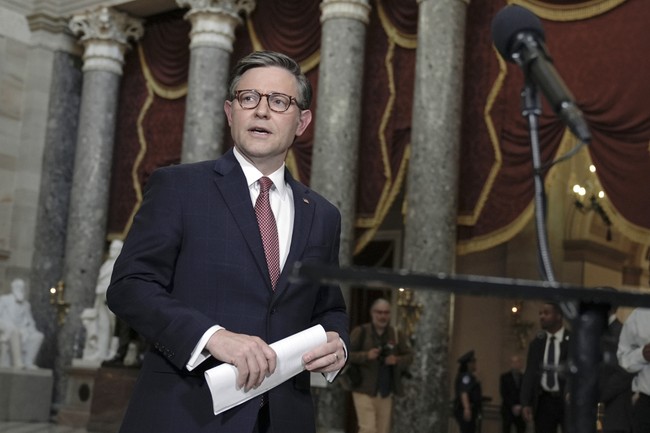
One of the key hurdles that Speaker Mike Johnson (R-LA) needed to clear for the House before the Christmas break passed Wednesday afternoon on a bipartisan basis.
The National Defense Authorization Act, a mammoth 1800-plus-page package, cleared the House on a 281-140 vote (200 Republicans and 81 Democrats voted “yes”) and will now head to the Senate where GOP Whip (and soon-to-be Majority Leader) John Thune (R-SD) indicates it will hit the floor early next week.
Congressional leaders unveiled the sprawling $883.7 billion package over the weekend, which includes a 14.5 percent pay raise for junior enlisted service members and a 4.5 increase for all other members.
The legislation advanced out of the House despite opposition from liberal Democrats, and some apprehension from Republicans, who took issue with a number of culture-war amendments that made it into the traditionally bipartisan bill.
The most contentious provision is a restriction on the use of funds from TRICARE, the health care program for active-duty service members, for gender-affirming care for the children 18 years and younger of service members.
As noted, some House members weren’t enthralled with several amendments. And it isn’t just the Democrats upset over the restriction on providing coverage for “gender-affirming care” for minors — some Republicans weren’t fans of it either.
House Armed Services Committee Chair Mike Rogers (R-Ala.) also said he was unhappy that Johnson did this on the NDAA, although he strongly supports the speaker’s position on this issue. Rogers said that since President-elect Donald Trump will bar such medical coverage soon after he’s sworn in on Jan. 20, there was no reason to do this via the NDAA.
“We’ll win tomorrow, but it will be close,” Rogers told reporters Tuesday night. “[Trump] is going to stop all these social, cultural issues from being embedded as policies. So my point is, I don’t know why this is going to be in the bill when on Jan. 20, it’s a moot point.”
“This stuff does not belong in our bill,” Rogers added. “[Johnson] didn’t talk to me about it. My preference would’ve been we just let [Trump] on Jan. 20 deal with these kinds of policies, which he’s already indicated he’s going to do. But nobody asked me.”
(Rogers did ultimately vote in favor of the bill, incidentally.)
WATCH: Speaker Johnson Just Weighed In on Biden Demand for More Cash for Ukraine Before Trump 2.0
Deal Struck: Government Will Remain Funded—for Now
What remains unclear is whether the measure, with the “culture-war amendments” included, will have the votes in the Senate.
Democrats have struggled with messaging on culture war battles, and some of them, including Rep. Seth Moulton (D-Mass.), who sits on the House Armed Services Committee, have expressed concern that such issues may have contributed to the Vice President Harris’s loss to Trump.
It’s also not clear how much Republicans are willing to push for the transgender provision, considering the incoming Trump administration has promised to strip the Defense Department of “woke” policies and could end up enacting strict rules on cultural issues.
The NDAA also included other culture war provisions, including a requirement that the Defense Department not create new positions related to diversity, equity and inclusion (DEI) efforts. Republicans have long attacked DEI as distracting the U.S. military with issues related to gender identity, race and sexual orientation instead of focusing on strength.
Current Majority Leader Chuck Schumer (D-NY) is expected to secure an agreement to advance the bill or file cloture Thursday to set up a Monday cloture vote, putting the measure on track for a final vote next Wednesday.
Next up: the continuing resolution to fund the government, likely through March. We should know more about what that deal looks like come Thursday.
